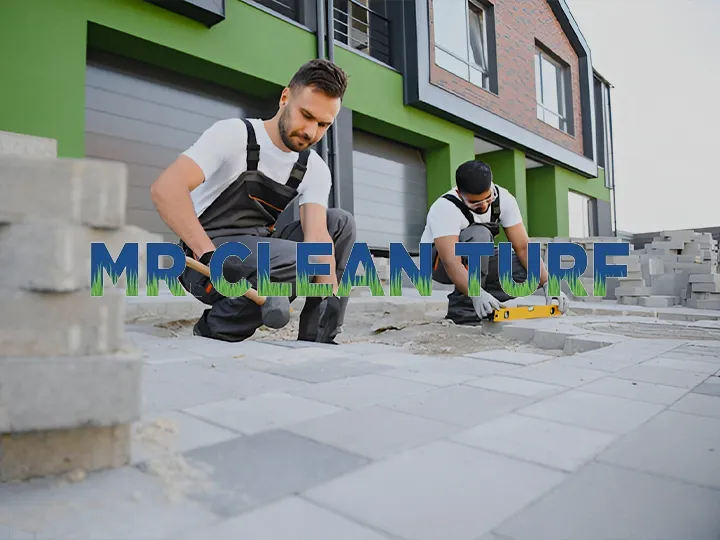DIY or Professional Installation: Which is Best for Sandstone Pavers?
Outdoor spaces choose sandstone pavers because these stones provide both an attractive looks and superior durability. Users planning patio construction and driveways must determine between self-installation and professional contractor employment, which dramatically affects results. Installation by yourself saves money while bringing personal fulfillment, yet demands your effort, time, and equipment inventory.
These paver installations performed by professionals deliver greater exactness combined with time-efficient execution that produces enduring outcomes, particularly among larger, intricate installations. You will be able to select the best home and budget-compatible choice by examining the advantages and drawbacks of each available option.
Multiple elements exist that will help you determine the right direction to take.
DIY vs. Professional Installation: Key Factors to Consider
Multiple elements influence the choice between self-installation and professional installation of sandstone pavers. Duration and skill ability, and material expense, along with a prolonged operational life span, are the dominant factors to assess. The evaluation of benefits and difficulties for every option in your project will assist you in determining the optimal solution. The following breakdown of essential factors will help you decide between installing sandstone pavers yourself or hiring professionals.
Cost Comparison
Professional installation of sandstone pavers and associated materials, including pavers and gravel, and sand, costs $10–$20 per square foot. You will save money on labor expenses, but you need to dedicate funds for a compactor, together with a level and a masonry saw. The ease of installation for brick pavers and rubber pavers contrasts with the additional demands of sandstone, which requires cutting and decreases installation speed. Professional installation of stone pavers spans from $20 to $40 per square foot and includes both the costs of labor and necessary tools, along with warranty provisions. The preparation of base material stands as a crucial step that experts should perform, especially when working with flagstone pavers or cobblestone pavers.
Skill and Time Requirements
DIY installation of paver projects requires users to have basic skills for base leveling and cutting to achieve satisfactory alignment of the pavers. The installation of small paver surfaces (100 sq ft and below) requires a duration between 2 and 5 days. The installation of bluestone pavers or limestone pavers demands exact cutting, which becomes difficult when using tools available to amateurs. Professional contractors manage to complete matching tasks within 1 to 3 days because they employ laser-guided level equipment.
Long-Term Durability
Base installation problems at the beginning phase will inevitably result in base movement or cracking over time. The installation of proper drainage requires professionals to use 4-6 inches of crushed gravel and sand that maintains stability, especially for heavy materials such as concrete pavers or natural stone. Individual homeowners who do their projects frequently fail to build correct drainage slopes between 1% and 2%, thus causing water accumulation problems. Professional services eliminate the risks that cause pavers to deteriorate, thus extending their lifetime to multiple decades.
When to Choose DIY Installation
Small Projects: Those who wish to construct patios or garden paths and fire pits should consider DIY installation for areas less than 100 square feet.
Budget-Friendly: The approach allows you to save money by using the same tools for upcoming tasks while you lay rubber pavers.
Skill Confidence: The installation quality improves when you have worked on masonry before or handled materials similar to pavers, such as brick pavers.
Common DIY mistakes
- Uneven base layers.
- The improper arrangement of joints in the installation allows weeds to invade the empty spaces.
- Regular sealing of sandstone pavers should not be omitted when building with this material.
When to Hire a Professional
- Large/Complex Designs: Professional assistance is necessary for driveway construction, along with other complex designs, including pool decks and elaborate patterns.
- Zero Experience: You need to avoid the risk of heavy materials such as cobblestone pavers and bluestone pavers if your experience level is zero.
- Warranties: Professional contractors give their work a warranty that extends from five to ten years.
Pro Advantages:
- Professional building projects requiring permits must follow the requirements determined by local authorities.
- Two types of professional construction tools are plate compactors and wet saws.
- Adequate drainage solutions are needed for regions where rainfall amounts or freeze-thaw patterns are high.
How Climate Affects Your Choice
As a protective measure against frost heaves in cold regions, you must use gravel layers exceeding six inches deep. The maintenance requirement for sandstone pavers in humid climates includes a two-year seal application. The maintenance requirements of both limestone pavers and flagstone pavers can match up.
Comparing Other Paver Types
The widespread popularity of sandstone pavers does not rule out the need to research additional paver types suitable for your specific project. The selection of pavers depends on your budget, your design choices, and your intended installation priorities. This blog provides an assessment of concrete pavers alongside brick pavers as well as bluestone pavers alongside rubber pavers when compared to sandstone pavers.
Paver Type |
Cost |
Durability |
Aesthetic Appeal |
Ease of Installation |
Maintenance |
Best Use Cases |
| Sandstone Pavers | Moderate to High | High (20+ years) | Natural, earthy look | Moderate to Difficult | Requires sealing | Patios, walkways, driveways |
| Concrete Pavers | Low to Moderate | Moderate (10–20 years) | Uniform, modern look | Easy to Moderate | Low maintenance | Driveways, pool decks, pathways |
| Brick Pavers | Moderate | Moderate (15–20 years) | Classic, rustic look | Easy to Moderate | May fade over time | Patios, garden paths, courtyards |
| Bluestone Pavers | High | Very High (25+ years) | Sleek, elegant look | Difficult | Low maintenance | High-end landscapes, pool decks |
| Rubber Pavers | Low | Low to Moderate (5–10 years) | Functional, less natural | Very Easy | Minimal maintenance | Play areas, gym floors, pathways |
| Flagstone Pavers | Moderate to High | High (20+ years) | Unique, natural look | Difficult | Requires sealing | Patios, garden paths, and stepping stones |
| Limestone Pavers | High | High (20+ years) | Refined, polished look | Difficult | Requires sealing | Elegant driveways, walkways |
| Cobblestone Pavers | High | Very High (25+ years) | Historic, timeless look | Difficult | Low maintenance | Driveways, historic restorations |
Final Decision-Making Checklist
Choose DIY If:
- Your previous home improvement experience includes laying both brick pavers and rubber pavers.
- The area is small and flat.
- You accept an extended span of completion time for this project.
Hire a Pro If:
- The design presents curves together with slopes that are typical in cobblestone paver installations.
- You feel uncertain about how to prepare the base underneath concrete pavers due to their weight.
- Warranties combined with code compliance standards are what you need right now.
Conclusion!
You can successfully install sandstone pavers in outdoor spaces provided you have the required skills and manage small projects. Clinical tasks requiring basic labor skills can usually lead to money savings when performed independently, as long as you possess sufficient tools alongside sufficient patience. Complex projects and substantial areas, along with technical uncertainty, require professional teams to handle installation.
With their expertise, experts prepare proper foundation bases while achieving precise installations to guarantee both the short- and long-term stability of the project. Your decision rests between your financial capacity, available time, and personal ability to perform the work yourself.
Users who need perfect sandstone pavers should contact Mr. Clean Turf to receive expert consultation and a free estimate. We provide expert consultation together with complimentary quotes to potential clients.



